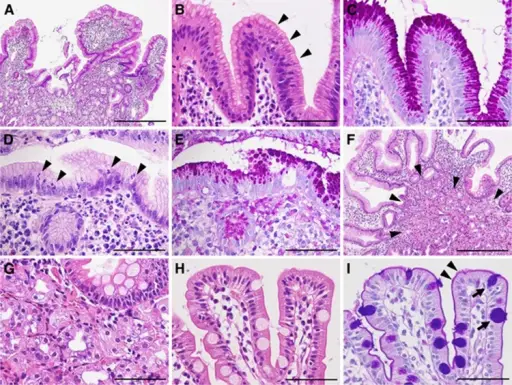Intestinal metaplasia is a precancerous change of the mucosa of the stomach with intestinal epithelium and is associated with an increased risk of dysplasia and cancer.
What is the Pathology of Intestinal Metaplasia?
The pathology of intestinal metaplasia is:
-Etiology: The cause of intestinal metaplasia are smoking, H. pylori infection, genetics having a close, first-degree relative with gastric cancer, environmental factors.
-Genes involved: SOX2, CDX.
-Pathogenesis: The sequence of events that lead to intestinal metaplasia are the replacement of one differentiated somatic cell type with another differentiated somatic cell type in the same tissue. Typically, metaplasia is triggered by environmental stimuli, which may act in concert with the deleterious effects of microorganisms and inflammation.
-Histology: The histology associated with intestinal metaplasia shows chronic inflammation due to Helicobacter pylori infection.
How does Intestinal Metaplasia Present?
Patients with intestinal metaplasia typically are both male or female at any age. The symptoms, features, and clinical findings associated with intestinal metaplasia include: acid reflux, ulcers, gastritis, or gastroesophageal reflux disease.
How is Intestinal Metaplasia Diagnosed?
Intestinal metaplasia is diagnosed by upper endoscopy with biopsy.
How is Intestinal Metaplasia Treated?
Intestinal metaplasia is treated by removing the H. pylori infection completely by antibiotics.
What is the Prognosis of Intestinal Metaplasia?
The prognosis of intestinal metaplasia is poor. Intestinal metaplasia is believed to be a precancerous lesion that may lead to gastric cancer. If you have intestinal metaplasia, then your risk of getting gastric cancer is increased six times.



